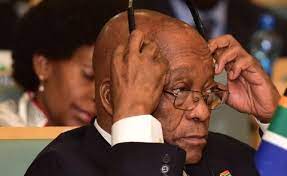‘We still have time’: Bheki Cele on Zuma arrest order

Former President Jacob Zuma
Police minister Bheki Cele on Monday morning said there was “no crisis of time” to act against former president Jacob Zuma.
This after Zuma was found guilty of contempt of court for failure to comply with an order issued by the Constitutional Court to honour a summons to appear before the state capture inquiry.
He was sentenced to 15 months behind bars, and was given five days to do so. If Zuma did not present himself at a police station, the court ordered the police minister and commissioner of police must, within three days, “take all steps that are necessary and permissible in law to ensure” he is delivered to a correctional centre.
This would have meant the police had until Wednesday to act against Zuma if he did not abide by the ruling.
In a last-ditch attempt to save himself from prison, Zuma has applied to the apex court to rescind its order.Former president Jacob Zuma addressing supporters at his homestead in KwaZulu-Natal.
Cele said they had sought clarification on what steps to take.
“We’ve still got a lot of hours. We don’t have a crisis of time.
“We hope we will be getting because when we were given the instruction there were no other legal activities taking place.
“We have sought clarification and are waiting for the new activities happening in court. Are we to continue as [per] the instruction? We still have time on that one.”
After the court order was issued, hundreds of supporters camped and protested at Zuma’s Nkandla homestead in KwaZulu-Natal to “protect” him from incarceration. Crowds of people, many without masks, were seen marching together. It was also reported that supporters fired firearms metres away from Nkandla, an indication some supporters were armed.
Cele has rubbished claims that police failed to act.
“Just because you don’t see us on TV doesn’t mean we are not there. We took good time in preparation of Nkandla.
“I want to congratulate the police for the way they behaved at Nkandla. There were more than 100 people coming from hostels who were armed and mingling within the people.
“Police knew that and had that information. They tried to provoke police by firing shots in the air.
“There were many women and many children and police had to take a step back.”
If police had acted recklessly, blood would have been shed, Cele said.
“We had to absorb those insult. We have a reference point in SA. We have Marikana and we don’t want to go back there,” said Cele.
He said the police had learnt a lot from Marikana and used “suggestions” from the resulting Farlam commission.
The Police and Prisons Civil Rights Union (Popcru) commended the restraint displayed by officers at Nkandla.
“Despite the many explicit and provocative attempts displayed by some protesters, members of the service managed to de-escalate the potentially volatile situation which could have otherwise turned into a violent scene,” said the union.
Criticism levelled against perceived inaction by the police was unfair, Popcru said, signalling that no overt action did not mean no accountability.
“There are intelligence resources and methods deployed in ensuring those who act outside the bounds of the law are held accountable.”
On what was supposed to be his last day of freedom, former president Jacob Zuma spoke to hundreds of his supporters outside his Nkandla homestead – TIMESLIVE




